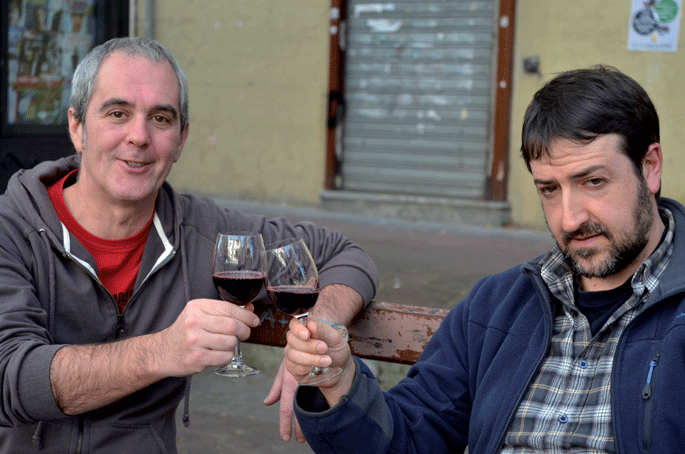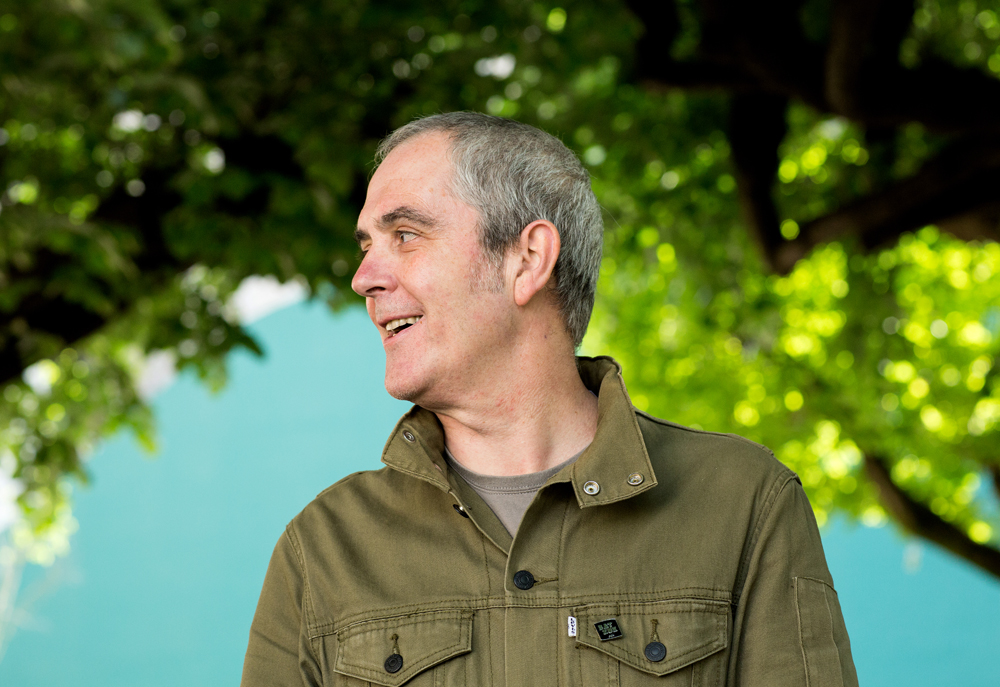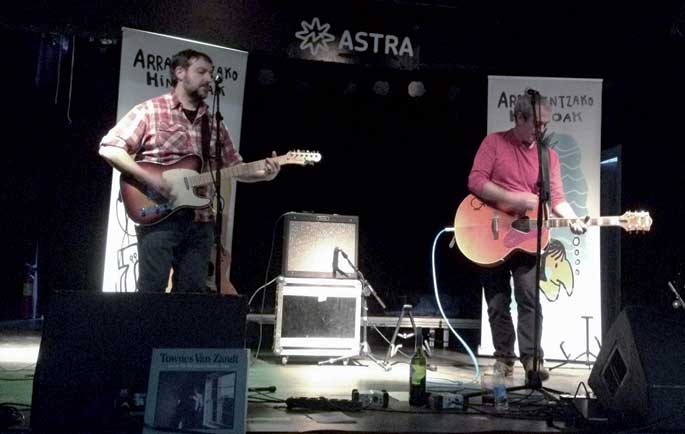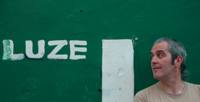"It's the time of the great hymns, but we're more interested in people's stories."
- Morau tells in his blog of the same name the adventures of two years of creating hymns for fish. After the contributions of his friends, and after countless versions, he has put Beñardo on a record, with which he has gathered 16 songs. In the tertulia, as in the album, Morau has put the skeleton and the letters, and Beñardo has been in charge of repairs.

Six years ago, you published something for the last time. What has changed since then?
Morau: Motivation has changed, the desire to make songs has changed. Now, as before, I wanted to tell him something. I wondered. What will I do with music? The answer was that I wanted to do something with Beñardo, simple and naked, without distraction and organized otherwise.
Beñardo: We have also gained in the experience. Musically, we're richer. Over the years, and also in other projects, the ability to curate songs increases. We're better musicians in our smallness.
Morau: It is also very important to be aware of our limitations, to act without shame and without complexes. We've shown without fear what we're doing.
The square was for the blog Himnoak. How did you come up with the idea of counting the whole process?
Morau: Reflection is very simple. I realized that if I make songs, it's not because I master music or because I have an amazing technique. I make songs because I like to tell stories. Today, we have more tools than ever for it, more and more media, without intermediaries. And it occurred to me. Why not tell what musicians never count? Creating songs costs me a lot of work; I'm going to tell them, and if anyone wants to contribute something, I'm going to give you the opportunity to do it.
Have the opinions expressed in the blog influenced?
Morau: He who wanted to influence has done so. I've noticed that if we ask people what your song looked like, they really respect what comes from the creation of others. Creators are reluctant to show our work, but others are also afraid to influence our work. What we have achieved is that forty or fifty people follow the whole process very closely.
Beñardo: Yes, but anyway, Morau's work was still a snack. Then, when I got to work, the process of arranging songs musically has started.
Morau has therefore been in charge of making the base of the album, and then Beñardo has put a little order.
Beñardo: Order and disorder, yes. We have had tensions as is normal, but we have been together for many years and we have learned to balance good and bad differences.
Morau: It's the fourth album that we do together, and at that level, I've given it more freedom than ever before. It has really been a partnership, and from the outset I have tried, although I have not always succeeded, to blur and relax all prevention measures. That's why it's the album by Morau and Beñardo, rather than being another album by Morau.
Now that improvisation commands, it is a two-year process that you have put on the table, without pretending to reach the general public. Are you comfortable against the current?
Morau: We see ourselves as a baserritarra who works her own vegetables. The tomatoes we make aren't all perfect, they don't have the perfect plastic and the perfect container, but they have flavor, and the audience we've looked for is the one who loves that taste.
Smallness is also a value, because it allows us to do these kinds of projects, pausing, doing tests, experimenting, but honestly recognizing what our defects and deficiencies are. Even though industry is upside down and shattered, our environment is filled with small, interesting projects. That's what attracts us.
You've been given a chronicler adjective, Morau, and you take it to your liking. Like political scientists, are there interesting times for the chronicler musician?
Morau: It's always interesting times for a chronicler singer-songwriter. The world is always a good raw material.
Beñardo: In these times, we need more chronicling musicians who, with humor and critical spirit, personally count on the bittersweet of the world.
Morau: This is related to the concept of fish hymns. Today is the time of hymns and big slogans, but we are at least interested in other things to do songs: stories, swings, attitudes…
So have you made the effort to update the coplas of the Ordinary Man of Lete?
Morau: Xabier Leterena is a radical dissection of the society of the time. And what if we tried to apply Lete's severe gaze to today's society? That's been my effort, I wanted to bring to our daily lives their humor, their bitterness and their rigor. That's also the oldest song on the record, and I had it in mind for a long time.
Beñardo: It's also not a version, because we've changed the music. Maybe it's the second part.
Morau: We have taken advantage of something we have done before, but always keeping to the maximum that rigor of Xabier Lete. Not wanting to compare with her, of course.
There's another song that serves to tell a story on the record: Gun, tweet, pum.
Morau: Yes, it's a good anecdote. The creation process had already been completed with fifteen songs, but then lawyers from Basque prisoners were arrested in Bilbao. The Ministry of the Interior filtered the facts on Twitter before the arrests took place, causing a great stir. That day, a Twitter user challenged me by saying that I had to make a song about that topic. I bitten the hook and in two days I wrote what had finally been the sixteenth.
Beñardo: Not bad that they asked no more, otherwise 20 songs would have left us.
All songs can be heard on the net, but you've also made physical discs, giving a lot of importance to the object.
Beñardo: For those of us who are collectors it is a pleasure to enjoy the object, although we too, in most of the music we hear in the MP3…
Morau: The disc has always been the object, but it is now a soulless industrial object in many cases. However, more and more people are bringing a personal touch and added value to their work, and that is what we have also done.
We've made the records following the line of the project, in auzolan, between friends. The most special thing we have is our personality and that of our friends, and that's what we wanted to give to the record. People have thanked him. It is true that the free entry of songs into the network has given us peace of mind. The album is a whim, created for those who really appreciate it.
Ixiar Artola has translated your songs into English and, though it may be unintentionally, you have found that reading them has taken another level. Are we so anglophilous?
Morau: It's a feature of pop and rock enthusiasts. We're used to listening to music in English, and even though as I barely understand anything, the songs we love most are the songs in English. There is also a tendency to think that in English everything has more value, or that for a Basque artist music cannot be a means of life… That doesn’t have to be so. The important thing is what and how you say it in any language. More universal is not English, but the one that shows us our minds without complexes.
Now it's the turn of the people in charge. Is it difficult to find a space for actions like yours?
Morau: Fortunately, one of the most interesting phenomena in recent years is the creation of spaces that promote the fondness of music: The coffee and the cookies, the Motz bar… There is a wider circuit. They're small places, but it's our natural environment.
Beñardo: And the organizers are also music lovers, people who appreciate music. This is very much appreciated. For musicians it is a joy, even if the economic conditions are not good, to feel that what is being organized is an appreciation of what we do.














